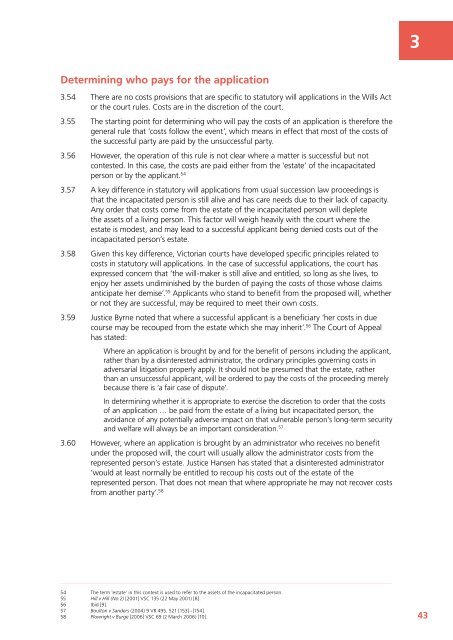Succession Laws - Victorian Law Reform Commission
Succession Laws - Victorian Law Reform Commission
Succession Laws - Victorian Law Reform Commission
Create successful ePaper yourself
Turn your PDF publications into a flip-book with our unique Google optimized e-Paper software.
3Determining who pays for the application3.54 There are no costs provisions that are specific to statutory will applications in the Wills Actor the court rules. Costs are in the discretion of the court.3.55 The starting point for determining who will pay the costs of an application is therefore thegeneral rule that ‘costs follow the event’, which means in effect that most of the costs ofthe successful party are paid by the unsuccessful party.3.56 However, the operation of this rule is not clear where a matter is successful but notcontested. In this case, the costs are paid either from the ‘estate’ of the incapacitatedperson or by the applicant. 543.57 A key difference in statutory will applications from usual succession law proceedings isthat the incapacitated person is still alive and has care needs due to their lack of capacity.Any order that costs come from the estate of the incapacitated person will depletethe assets of a living person. This factor will weigh heavily with the court where theestate is modest, and may lead to a successful applicant being denied costs out of theincapacitated person’s estate.3.58 Given this key difference, <strong>Victorian</strong> courts have developed specific principles related tocosts in statutory will applications. In the case of successful applications, the court hasexpressed concern that ‘the will-maker is still alive and entitled, so long as she lives, toenjoy her assets undiminished by the burden of paying the costs of those whose claimsanticipate her demise’. 55 Applicants who stand to benefit from the proposed will, whetheror not they are successful, may be required to meet their own costs.3.59 Justice Byrne noted that where a successful applicant is a beneficiary ‘her costs in duecourse may be recouped from the estate which she may inherit’. 56 The Court of Appealhas stated:Where an application is brought by and for the benefit of persons including the applicant,rather than by a disinterested administrator, the ordinary principles governing costs inadversarial litigation properly apply. It should not be presumed that the estate, ratherthan an unsuccessful applicant, will be ordered to pay the costs of the proceeding merelybecause there is ‘a fair case of dispute’.In determining whether it is appropriate to exercise the discretion to order that the costsof an application … be paid from the estate of a living but incapacitated person, theavoidance of any potentially adverse impact on that vulnerable person’s long-term securityand welfare will always be an important consideration. 573.60 However, where an application is brought by an administrator who receives no benefitunder the proposed will, the court will usually allow the administrator costs from therepresented person’s estate. Justice Hansen has stated that a disinterested administrator‘would at least normally be entitled to recoup his costs out of the estate of therepresented person. That does not mean that where appropriate he may not recover costsfrom another party’. 5854 The term ‘estate’ in this context is used to refer to the assets of the incapacitated person.55 Hill v Hill (No 2) [2001] VSC 135 (22 May 2001) [8].56 Ibid [9].57 Boulton v Sanders (2004) 9 VR 495, 521 [153]–[154].58 Plowright v Burge [2006] VSC 69 (2 March 2006) [10].43
















